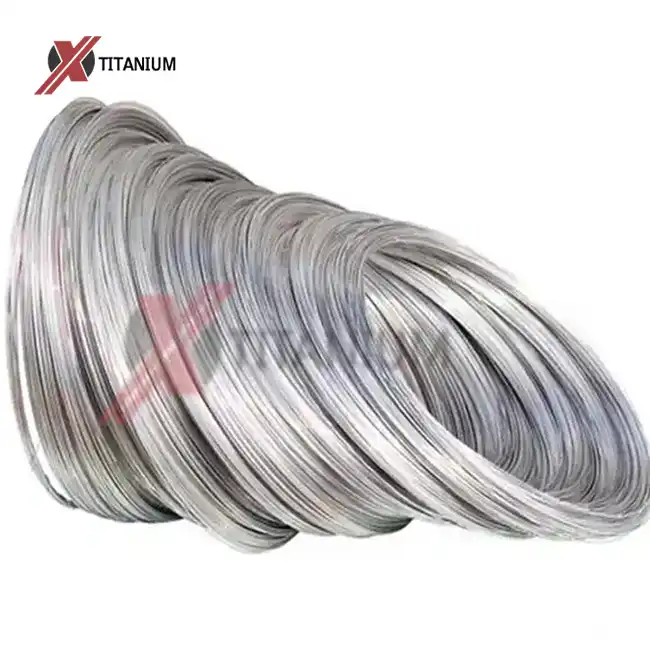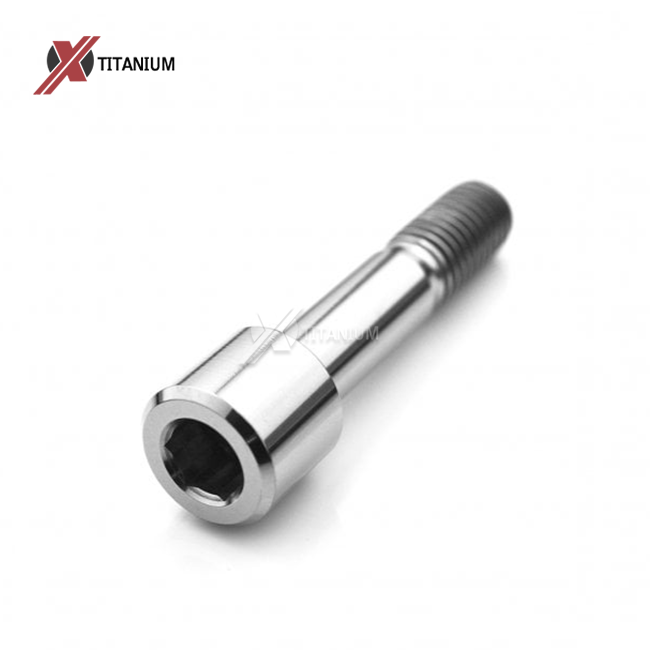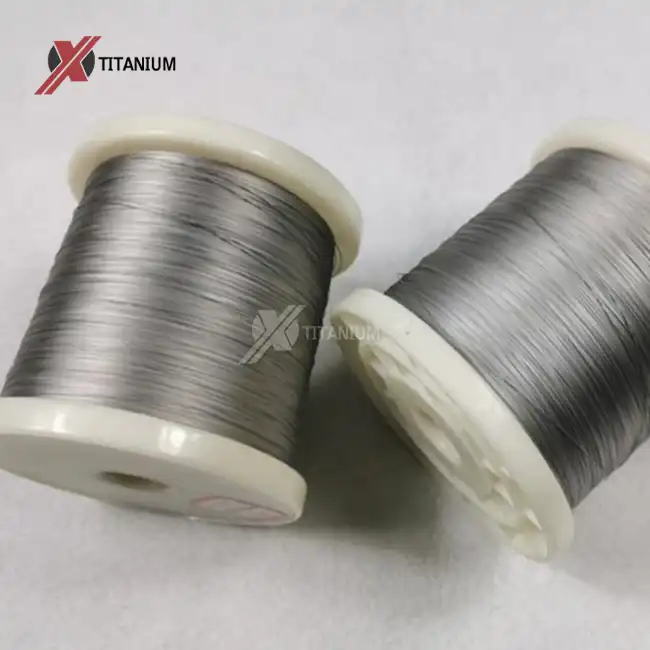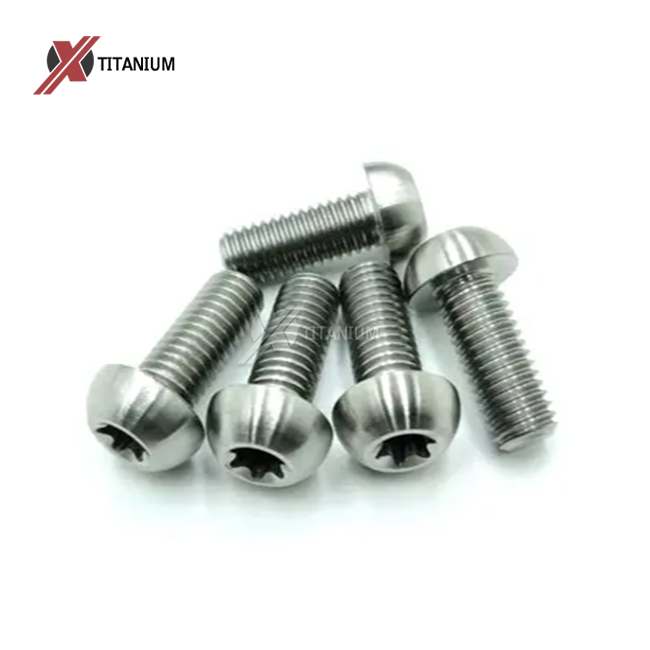Comprehending the Composition and Properties of Beta Titanium Wire
Composition and Microstructure
Beta titanium wire is composed primarily of titanium with the addition of 10-15% molybdenum. This specific composition results in a unique microstructure that gives the wire its distinctive properties. The beta phase of titanium, stabilized by the molybdenum content, creates a body-centered cubic crystal structure. This structure is responsible for the wire's enhanced strength and ductility compared to pure titanium or alpha titanium alloys.
The careful balance of elements in beta titanium wire allows for a material that combines the best attributes of titanium with improved workability and heat treatment capabilities. The presence of molybdenum not only stabilizes the beta phase but also contributes to the alloy's excellent corrosion resistance, particularly in chloride-rich environments.
Mechanical Properties
Beta titanium wire exhibits an impressive array of mechanical properties that make it suitable for a wide range of applications. With a tensile strength ranging from 900 to 1,200 MPa, it offers exceptional strength while maintaining a relatively low density of 4.42 g/cm³. This translates to an outstanding strength-to-weight ratio, a crucial factor in industries where weight reduction is paramount, such as aerospace and sports equipment manufacturing.
The wire's elongation capacity of 15-20% demonstrates its remarkable ductility and flexibility. This property is particularly valuable in applications requiring the wire to be formed or shaped without compromising its structural integrity. The combination of high strength and flexibility makes beta titanium wire an ideal choice for orthodontic archwires, spring applications, and other scenarios where both resilience and formability are needed.
Thermal and Chemical Characteristics
Beta titanium wire showcases excellent thermal stability, with a melting point of approximately 1,668 °C. This high melting point ensures that the wire maintains its mechanical properties even in high-temperature environments, making it suitable for use in heat-intensive industrial processes and aerospace applications.
The wire's chemical characteristics are equally impressive. Its exceptional corrosion resistance stems from the formation of a stable, self-healing oxide layer on the surface. This protective layer makes beta titanium wire highly resistant to various corrosive media, including seawater, acids, and industrial chemicals. The biocompatibility of the alloy, coupled with its corrosion resistance, makes it an excellent choice for medical implants and devices that come into contact with bodily fluids.
Applications and Advantages of Beta Titanium Wire
Aerospace Industry
In the aerospace sector, beta titanium wire finds extensive use in various critical components. Its high strength-to-weight ratio makes it ideal for aircraft and spacecraft structural elements, where weight reduction is crucial for fuel efficiency and performance. The wire is often used in fasteners, springs, and specialized connectors that must withstand extreme temperatures and pressures encountered during flight.
The material's resistance to fatigue and corrosion also makes it valuable in aerospace applications, where components are subjected to cyclic loading and exposed to diverse environmental conditions. Beta titanium wire's ability to maintain its properties in both cryogenic and elevated temperatures further enhances its suitability for space exploration technologies.
Medical and Dental Applications
The biocompatibility and corrosion resistance of beta titanium wire make it an excellent choice for medical and dental applications. In orthodontics, it is widely used for archwires due to its lower modulus of elasticity compared to stainless steel, allowing for more comfortable and efficient tooth movement. The wire's flexibility and shape memory properties enable orthodontists to create customized treatment plans for patients.
In the broader medical field, beta titanium wire is used in various implantable devices, surgical instruments, and prosthetics. Its non-toxic nature and resistance to bodily fluids reduce the risk of adverse reactions and ensure long-term stability within the human body. The wire's strength and durability also contribute to the longevity of medical devices, reducing the need for replacements and follow-up surgeries.
Industrial and Marine Applications
Beta titanium wire's exceptional corrosion resistance makes it invaluable in industrial and marine environments. In chemical processing plants, it is used for manufacturing components exposed to aggressive chemicals, such as reactor internals, pumps, and valves. The wire's ability to withstand harsh conditions without degradation ensures longer equipment life and reduced maintenance costs.
In marine applications, beta titanium wire is utilized in offshore structures, shipbuilding, and underwater equipment. Its resistance to saltwater corrosion and marine biofouling makes it an ideal material for long-term deployment in oceanic environments. The wire's high strength-to-weight ratio also contributes to the overall efficiency and performance of marine vessels and equipment.
Manufacturing Processes and Quality Control of Beta Titanium Wire
Production Techniques
The manufacturing of beta titanium wire involves several sophisticated processes to ensure the desired properties and quality. Cold rolling is often employed to achieve precise dimensions and enhance the wire's mechanical properties through work hardening. This process involves passing the wire through a series of rollers at room temperature, gradually reducing its diameter and increasing its strength.
Hot rolling may be used in the initial stages of production, especially for larger diameter wires. This technique involves heating the titanium alloy above its recrystallization temperature before rolling, allowing for significant reductions in cross-sectional area with less force. Annealing is another crucial step in the production process, used to relieve internal stresses and optimize the wire's microstructure for specific applications.
Pickling is often employed as a surface treatment to remove any oxide scale or contaminants that may have formed during the manufacturing process. This chemical process ensures a clean, uniform surface, which is essential for many applications, particularly in the medical and aerospace industries.
Surface Finishing Options
Beta titanium wire can be finished in various ways to meet specific application requirements. A bright finish can be achieved through careful control of the manufacturing process, resulting in a smooth, reflective surface ideal for aesthetic applications or where low friction is needed. Polishing can further enhance the surface smoothness, reducing microscopic imperfections and improving the wire's performance in applications such as medical implants.
For applications requiring enhanced surface properties, acid cleaning or sandblasting may be employed. Acid cleaning provides a thorough removal of surface contaminants and can create a passive layer for improved corrosion resistance. Sandblasting, on the other hand, can create a textured surface that may be beneficial for certain bonding or coating processes.
Quality Assurance and Testing
Rigorous quality control measures are essential in the production of beta titanium wire to ensure consistency and reliability. Hardness testing is routinely performed to verify the wire's mechanical properties and ensure it meets the required specifications. This may involve techniques such as Vickers or Rockwell hardness testing, providing quantitative data on the wire's resistance to deformation.
Bending tests are crucial for assessing the wire's flexibility and formability, particularly important for applications in orthodontics and spring manufacturing. These tests evaluate the wire's ability to withstand bending stresses without fracturing or losing its mechanical properties.
Hydrostatic testing may be employed for beta titanium wire intended for high-pressure applications. This test involves subjecting the wire to pressurized fluid to assess its strength and integrity under simulated operating conditions. Additionally, comprehensive chemical analysis and microstructural examinations are often conducted to ensure the wire's composition and internal structure meet the required standards.
Through these meticulous manufacturing processes and quality control measures, producers of beta titanium wire can ensure a product that consistently delivers high corrosion resistance, low density, and good thermal stability. These properties, combined with the wire's versatility, make it an invaluable material in chemical processing, industrial applications, sports equipment, and numerous other fields where performance and reliability are paramount.
Conclusion
Beta titanium wire stands out as an exceptional material, offering a unique combination of properties that make it invaluable across various industries. Its high strength-to-weight ratio, excellent corrosion resistance, and biocompatibility render it ideal for aerospace, medical, and industrial applications. The wire's ability to maintain its mechanical properties under extreme conditions, coupled with its flexibility and durability, positions it as a top choice for demanding environments. While the initial cost may be higher compared to some alternatives, the long-term benefits and performance of beta titanium wire often justify the investment. As technology advances and new applications emerge, the demand for this versatile material is likely to grow, solidifying its position as a crucial component in cutting-edge industries.
If you're looking for high-quality beta titanium wire or other titanium products, look no further than Baoji Chuanglian New Metal Material Co., Ltd. As a leading manufacturer and exporter of titanium products, we specialize in researching, producing, and machining various titanium and rare metal products. Our expertise extends to customized beta titanium wire solutions tailored to your specific needs. Whether you're in the aerospace, medical, or industrial sector, we have the knowledge and experience to meet your requirements. Contact us today at info@cltifastener.com or djy6580@aliyun.com to learn more about how our beta titanium wire can enhance your projects and products.
FAQ
What makes beta titanium wire different from other titanium alloys?
Beta titanium wire contains 10-15% molybdenum, which stabilizes the beta phase, resulting in higher strength, improved ductility, and better heat treatment capabilities compared to pure titanium or alpha titanium alloys.
Can beta titanium wire be customized for specific applications?
Yes, beta titanium wire can be customized through various manufacturing techniques like cold rolling, hot rolling, annealing, and surface treatments to meet specific application requirements.
How is the quality of beta titanium wire ensured?
Quality is ensured through rigorous testing methods including hardness tests, bending tests, and hydrostatic tests, as well as comprehensive chemical analysis and microstructural examinations.
References
1. Lutjering, G., & Williams, J. C. (2007). Titanium (2nd ed.). Springer-Verlag Berlin Heidelberg.
2. Froes, F. H. (2015). Titanium: Physical Metallurgy, Processing, and Applications. ASM International.
3. Peters, M., Hemptenmacher, J., Kumpfert, J., & Leyens, C. (2003). Structure and Properties of Titanium and Titanium Alloys. In Titanium and Titanium Alloys: Fundamentals and Applications (pp. 1-36). Wiley-VCH.
4. Banerjee, D., & Williams, J. C. (2013). Perspectives on Titanium Science and Technology. Acta Materialia, 61(3), 844-879.
5. Boyer, R. R. (1996). An overview on the use of titanium in the aerospace industry. Materials Science and Engineering: A, 213(1-2), 103-114.




